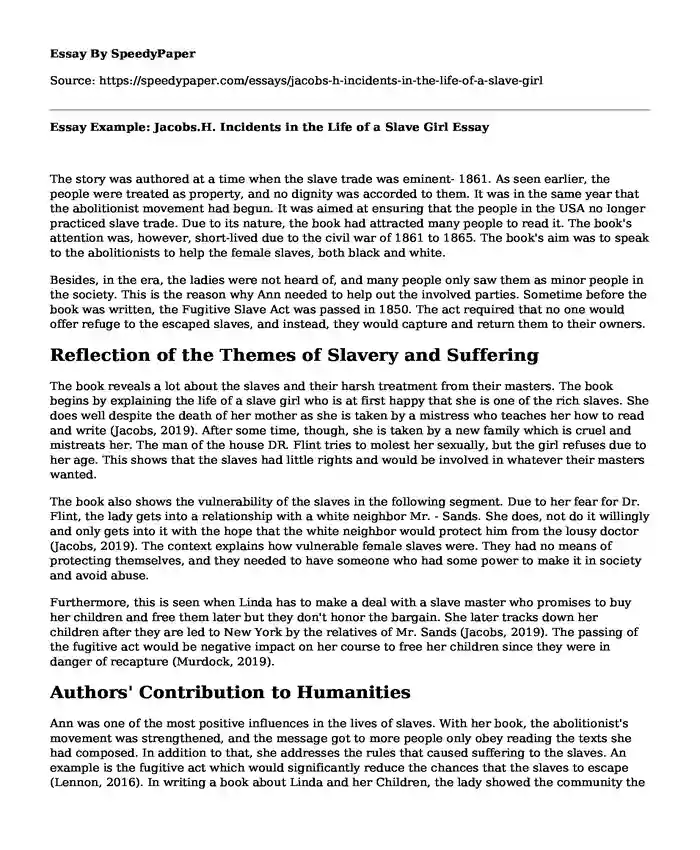The story was authored at a time when the slave trade was eminent- 1861. As seen earlier, the people were treated as property, and no dignity was accorded to them. It was in the same year that the abolitionist movement had begun. It was aimed at ensuring that the people in the USA no longer practiced slave trade. Due to its nature, the book had attracted many people to read it. The book's attention was, however, short-lived due to the civil war of 1861 to 1865. The book's aim was to speak to the abolitionists to help the female slaves, both black and white.
Besides, in the era, the ladies were not heard of, and many people only saw them as minor people in the society. This is the reason why Ann needed to help out the involved parties. Sometime before the book was written, the Fugitive Slave Act was passed in 1850. The act required that no one would offer refuge to the escaped slaves, and instead, they would capture and return them to their owners.
Reflection of the Themes of Slavery and Suffering
The book reveals a lot about the slaves and their harsh treatment from their masters. The book begins by explaining the life of a slave girl who is at first happy that she is one of the rich slaves. She does well despite the death of her mother as she is taken by a mistress who teaches her how to read and write (Jacobs, 2019). After some time, though, she is taken by a new family which is cruel and mistreats her. The man of the house DR. Flint tries to molest her sexually, but the girl refuses due to her age. This shows that the slaves had little rights and would be involved in whatever their masters wanted.
The book also shows the vulnerability of the slaves in the following segment. Due to her fear for Dr. Flint, the lady gets into a relationship with a white neighbor Mr. - Sands. She does, not do it willingly and only gets into it with the hope that the white neighbor would protect him from the lousy doctor (Jacobs, 2019). The context explains how vulnerable female slaves were. They had no means of protecting themselves, and they needed to have someone who had some power to make it in society and avoid abuse.
Furthermore, this is seen when Linda has to make a deal with a slave master who promises to buy her children and free them later but they don't honor the bargain. She later tracks down her children after they are led to New York by the relatives of Mr. Sands (Jacobs, 2019). The passing of the fugitive act would be negative impact on her course to free her children since they were in danger of recapture (Murdock, 2019).
Authors' Contribution to Humanities
Ann was one of the most positive influences in the lives of slaves. With her book, the abolitionist's movement was strengthened, and the message got to more people only obey reading the texts she had composed. In addition to that, she addresses the rules that caused suffering to the slaves. An example is the fugitive act which would significantly reduce the chances that the slaves to escape (Lennon, 2016). In writing a book about Linda and her Children, the lady showed the community the ill effects of the trade and gave them a reason why it should be stopped.
In conclusion, the lady also encouraged slaves by showing them that they could resist the reign by harsh slave owners. The book also highlights the challenges that the ladies in the community suffered from due to sexual harassment from their managers. The use of slaves for sexual pleasure was demeaning to the confidence of female slaves and they had to look for means to avoid it such as by looking for other people in higher positions to protect them. Slavery was a very bad business and the people under it suffered significantly.
References
Jacobs, H. (2019). Incidents in the Life of a Slave Girl. Lulu. Com. https://books.google.co.ke/books?hl=en&lr=&id=c1WZDwAAQBAJ&oi=fnd&pg=PR3&dq=The+life+of+a+slave+girl&ots=wa2EK1i37s&sig=Ul0z3QLN-qh5FSeDGJ3uRqxG2HY&redir_esc=y#v=onepage&q=The%20life%20of%20a%20slave%20girl&f=false
Lennon, C. (2016). Slave escape, prices, and the fugitive slave act of 1850. The Journal of Law and Economics, 59(3), 669-695. https://www.journals.uchicago.edu/doi/abs/10.1086/689619
Murdock, D. (2019). Slavery in America. Network Journal, 26(1), 42-42. https://search.proquest.com/openview/60654c46f866cb69c8f5d84bf3b31a46/1?pq-origsite=gscholar&cbl=43721
Cite this page
Essay Example: Jacobs.H. Incidents in the Life of a Slave Girl. (2023, Feb 13). Retrieved from https://speedypaper.com/essays/jacobs-h-incidents-in-the-life-of-a-slave-girl
Request Removal
If you are the original author of this essay and no longer wish to have it published on the SpeedyPaper website, please click below to request its removal:
- Free Essay on Toyota's Marketing Plan, Strategies, and Outcomes
- Free Essay in American History: Expansion, War and Reconstruction
- Social Media and Communications: Essay Example for Everyone
- Free Essay on the Art of Negotiation and The Chicago Teacher Union Strike
- Essay Example on Public Stewardship in Budgeting
- Delinquency Prevention Paper Sample
- Free Paper Sample: The Plunkitt of Tammany Hall
Popular categories





